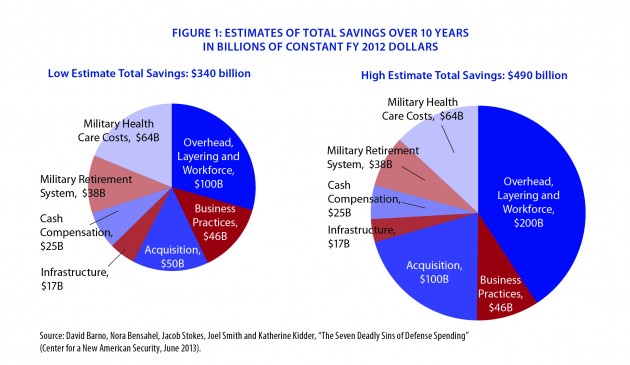Congress, SecDef MUST Lead Pentagon From The Vale Of Seven Sins: CNAS
Posted on
WASHINGTON: Some of Chuck Hagel’s best friends in the defense world offered him a compelling report on how to save almost as much as the $500 billion that the Budget Control Act will force him and his successors to cut over the next decade.
The wonderful title of the report, “The Seven Deadly Sins of Defense Spending,” will certainly give this effort a better chance of cutting through the enormous amount of white noise currently surrounding the sequestration and drawdown debate. Also, the Center for a New American Security (CNAS) has close ties to the Obama administration that will give this report a much better chance of being read at senior levels in the Pentagon than most of the myriad other budget prescriptions.
Here are:
The Seven Deadly Sins
- Redundant overhead, layering and workforce;
- Inefficient business practices;
- Excessive acquisition costs and overruns;
- Excess infrastructure, installations and management costs;
- Unaffordable increases in cash compensation;
- Unsustainable growth of military retirement system costs; and
- Escalating military health care costs.
Of course, none of those are new in and of themselves. But the report’s five authors provide fairly specific areas where the Pentagon could cut without endangering the country’s ability to project power globally.
But much of the discussion at this morning’s event was relatively glum, focused on the need for (and correspondent lack of) leadership if the Pentagon is to successfully navigate the drawdown at the same time it complies with sequestration.
David Barno, retired lieutnenant general and the report’s lead author, said the Pentagon can “either go down the reform route and change these structural problems that are worsening year after year,” or in 20 years from now, “we won’t be able to play the role the United States has played for the past five decades.”
The one consistent them during the Q and A was that Defense Secretary Chuck Hagel, Chairman of the Joint Chiefs Gen. Martin Dempsey and the four Joint Chiefs of Staff must lead. They must talk to members of Congress and tell them both the stakes and the costs if they don’t act. They must go before the country and tell Americans that our country will not be the single global power if they and Congress don’t act.
“This is the core issue, leadership,” Barno said. “To me, it constantly comes back to the Congress of the United States.”
But he also called out Hagel and Dempsey, saying “I don’t see the SecDef or the chairman working the Hill.”
Later, he went into a bit more detail, nailing Congress as the “primary sinner” on three of the seven sins: base closures, pay and healthcare.
“In the other four categories, the department has been doing very little,” he said.
Nora Bensahel, Barno’s co-author, called for what she described as “sustained leadership” because “the strategy is in danger.” She called on the Joint Chiefs of Staff to “come out extremely strongly on these issues,” noting that while civilians can make the case, the uniformed military carries prestige and credibility that cannot be matched by civilians.
The report was released on the same day that Hagel got his first briefing about the strategic review he ordered soon after taking office. I asked Barno and Bensahel and Erin Conaton (former undersecretary of Defense for personnel and readiness now at CNAS) if they thought the review would be another paper hanging exercise or might actually drive some prescriptive actions by the senior Pentagon leadership. They were skeptical.
“There was a lot of consensus and senior level buy in including all the way to the president with the strategy that was rolled out previously,” Conaton said, referring to the strategy then Defense Secretary Leon Panetta helped hammer out. “I think there will be a reluctance to move away from that strategic vision because a lot of senior leaders think it’s the right thing to do.”
Subscribe to our newsletter
Promotions, new products and sales. Directly to your inbox.

